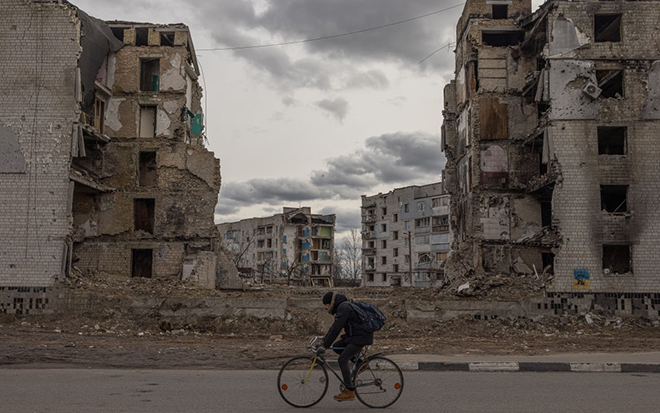
|
A man rides a bicycle past residential buildings that were destroyed during the Russian attack on Feb. 20, 2023, in Borodyanka, Kyiv region, Ukraine. |
The insurance industry is struggling to gauge the cost of Russia's war with Ukraine a year after the conflict began.
Exposures far removed from the war itself have been unearthed, while insurers are unable to count the cost of claims across their political risk, marine and aviation business lines. Those covered by the political violence market, such as physical damage to buildings, are also proving difficult to quantify.
.
|
"It becomes challenging for a claim to be resolved when the market's clients are unable to access their asset and insurers are unable to send in a loss adjuster safely to ascertain the damage," Crispin Hodges, head of trade political risk at Lloyd's insurer Canopius Group Ltd., said in an interview.
Lancashire Holdings Ltd. increased its provision for potential losses to $65.8 million in the fourth quarter of 2022 to account for indirect claims across a number of classes, after setting aside $22 million for direct claims in the first quarter. Swiss Re AG increased its Ukraine war reserve across its property and casualty reinsurance and large global commercial insurance businesses to $334 million in the fourth quarter, from $283 million in the first quarter.
Riot risk
The resulting increase in oil and food costs is making it challenging for developing economies to keep their countries running and their people fed, bringing the threat of civil unrest and riots, which would hit the political violence and political risk markets, according to Hodges.
"You're generally going to see a lot of tightening of underwriting as well as more disciplined analysis and more stock put in the merit to the individual insured," Hodges said.
Global political risk programs offered to countries with benign loss records at "shockingly cheap" rates have also been shown to be uneconomical, Hodges added. "It's quite hard to see how one is going to make money out of those when an event such as Ukraine could well cause a loss that is 20, 30, 40 years' worth of premium," he said.
Trouble at sea
Marine war reinsurance cover for the affected area has essentially disappeared, meaning insurers are saddled with all of the risk they underwrite. "Whatever they do is net and therefore, they'll be monitoring the aggregations even more stringently than they were before," said Neil Roberts, head of marine and aviation at the Lloyd's Market Association, a trade body for Lloyd's of London underwriters.
Underwriters in the aviation insurance market face billions of dollars of claims from aircraft lessors whose planes are stranded in Russia. Legal battles between lessors and insurers are playing out in courts around the world and will take several years to resolve. It has been an eye-opener for underwriters, Roberts said. "What would be a relatively small part of a commercial underwriting book suddenly has a potential for a very disproportionate loss as against the property side or the marine side of your book."
No quick fix
There are some claims that will crystallize relatively quickly. At the one-year mark, vessels can be declared a constructive total loss under standard wording in marine war policies, so the one-year anniversary of the war will trigger claims for the ships stranded in Ukrainian ports. There is unlikely to be much scope for dispute here, according to Jonathan Bruce, deputy head of the global insurance and reinsurance group at law firm HFW. "In this case, it's fairly clear because you've got an order closing all of the ports in Ukraine," he said.
For the most part, however, the effects of the war will be felt for some time. Many policies in the political risk, trade credit and political violence market have a duration of longer than 12 months. "There will still be quite a long event horizon before people see exposures dramatically reduce, unless they had made a conscious decision not to write [in Russia and Ukraine] some time in advance," Canopius' Hodges said.
To learn more about how the war has affected different markets and sectors sign up for a demo of S&P Capital IQ Pro




